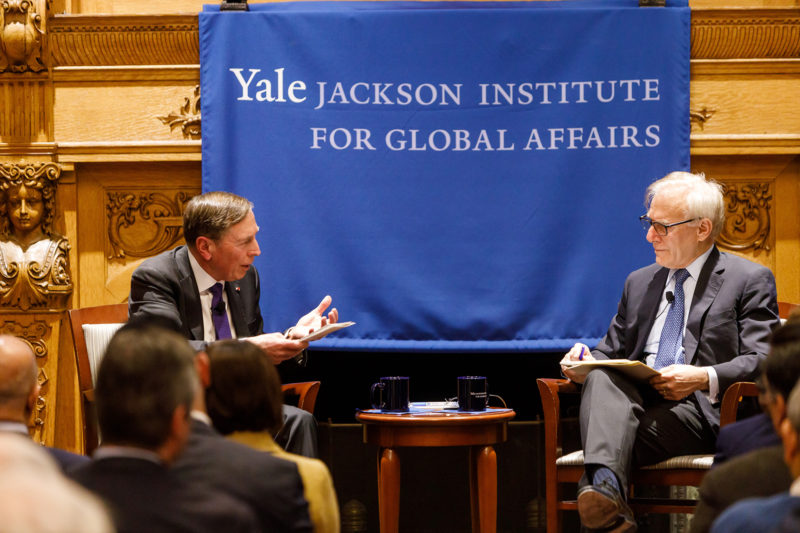Gen. David Petraeus and David Ignatius of The Washington Post sat down February 18 for a timely discussion on the Middle East.
Two experts on the challenges facing the Middle East sat down for a timely discussion on February 18 in the Jackson Institute’s Horchow Hall.
Gen. David Petraeus, former commander of U.S. Central Command who served more than 37 years in the U.S. military, including command of coalition forces in Iraq and Afghanistan, and David Ignatius, foreign affairs columnist for The Washington Post who has covered the Middle East for two decades, addressed the topic, The Middle East in Crisis: A Role for America?” The discussion, before a standing-room-only crowd, was part of Jackson’s Visiting Fellow Discussion Forum series.
Ignatius opened up the conversation by acknowledging the many other Middle East experts in the room, including Staffan de Mistura, former Undersecretary General of the UN and Special Representative for Syria, Iraq, and Afghanistan, and Jackson Senior Fellows Emma Sky and Ambassador Ryan Crocker.
Ignatius relayed a piece of advice he received as a young journalist about covering the troubled region: “When it comes to the Middle East, pessimism pays,” he said.
When asked why Americans should continue to care about the Middle East, despite 20 years of war, numerous lives lost and dollars spent there, Petraeus listed five key reasons:
- Ungoverned spaces will be exploited by outside forces
- You have to do something about it
- The U.S. has to lead because of its enormous capabilities and resources relative to its partners
- You can’t kill or capture your way out of an insurgency—civil-military governance is required
- This is a generational struggle
When the conversation turned to Afghanistan, Petraeus acknowledged the many obstacles to achieving peace, particularly when so many disparate groups are involved. “It’s such a difficult case. The challenges are enormous. It’s not a country you can flip,” he said. “I’d love to see a political solution.”
Ignatius also questioned Petraeus about the controversial U.S. strike that killed Iranian general Qasem Soleimani, and why forces under Petraeus’ command never attempted a similar feat. “We never took it that high,” Petraeus said, emphasizing that it was not solely a military decision. But, he said, “I saw him always as a military target, not a government official.”
Regarding the recent strike, Petraeus observed, “That is probably not the end of this.”
When asked about what lies ahead for warfare in the Middle East, Petraeus predicted that cyber warfare, social media and remotely piloted aircraft (drones) will play an increasingly larger role.
Petraeus also took audience questions on a variety of topics, including the reliability of Turkey as an ally, the relationship between civilian and military populations in the U.S., and the future military investments.
Petraeus acknowledged a need to transition from investing in aircraft carriers and tanks to drones and cyber capability, but he predicted resistance from within the military and from American communities that produce this equipment. “If you think turning an aircraft carrier is hard, try turning a service,” he said. “We’re making the transition, but far too slowly.”
